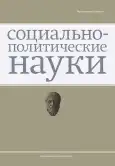Категория «гендер» в контексте применения ВРТ: от «тьмы» практических проблем к «свету» законодательных решений
- Авторы: Довнар А.Н.1
-
Учреждения:
- Московский государственный гуманитарно-экономический университет»
- Выпуск: Том 12, № 4 (2022)
- Страницы: 144-151
- Раздел: Статьи
- URL: https://journal-vniispk.ru/2223-0092/article/view/146998
- ID: 146998
Цитировать
Аннотация
Реализация вспомогательных репродуктивных технологий (далее - ВРТ) характеризуется как «спасательный круг» для лиц, которые не могут по каким-либо причинам осуществить свою репродуктивную функцию, и вынуждены преодолевать бесплодие через оказание им специализированной медицинской помощи. Вместе с тем технологический прогресс в репродуктивной медицине таит в себе целую плеяду проблемных аспектов, подвергнутых автором предпринятого исследования всестороннему анализу: 1) отсутствие четкой определенности в возможности (невозможности) для одинокого мужчины использовать ВРТ; 2) половинчатость правового регулирования брачно-семейных отношений, в процессе которых один из супругов решит сменить пол, что свидетельствует о фактической легализованности «нетрадиционных» браков; 3) проведение искусственного прерывания беременности по признаку пола будущего ребенка. Для эффективного решения обозначенных проблем необходимо принятие на законодательном уровне следующих решений: 1) наделение одинокого мужчины наравне с одинокой женщиной правом пользоваться ВРТ для преодоления бесплодия; 2) установление запрета для лиц, в отношении которых запущена процедура смены пола, могущая привести к образованию однополого союза, вступать в брак, а также введение в качестве основания для расторжения брака предоставление документа о смене пола; 3) введение запрета на совершение аборта по признаку пола будущего ребенка, а также проведение искусственного прерывания беременности по немедицинским показаниям.
Полный текст
Открыть статью на сайте журналаОб авторах
Алексей Николаевич Довнар
Московский государственный гуманитарно-экономический университет»
Email: dovnar.mggeu@mail.ru
факультет юриспруденции Москва, Российская Федерация
Список литературы
- Акимова Ю.А. Реализация права на вступление в брак, создание, поддержку и защиту семьи с точки зрения принципа гендерного равноправия // Государство и право. 2020. № 5. С. 71.
- В МИЦ «Известия» обсуждают возможный запрет суррогатного материнства в России. URL: https://iz.ru/1289412/2022-02-11/v-mitc-izvestiia-obsuzhdaiut-vozmozhnyi-zapret-surrogatnogo-materinstva-v-rossii (дата обращения: 04.06.2022).
- Волошин А.И., Деревянкина С.А. Селективные аборты как форма нарушения репродуктивных прав женщин // Ученые записки Крымского федерального университета имени В.И. Вернадского. Юридические науки. 2020. Т. 6. № 2. С. 124.
- Довнар А.Н. Изменения в законодательстве и проблемы репродуктивного туризма: обзор слушаний в Общественной палате Российской Федерации // Пробелы в российском законодательстве. 2021. Т. 14. № 1. С. 88.
- Довнар А.Н. Правовые проблемы, связанные с процессом изменения пола и защитой прав интерсекс-пациентов в Российской Федерации // Проблемы экономики и юридической практики. 2022. Т. 18. № 1. С. 74.
- Ерохина Е.В., Корнейчук К.Ю. Брачные отношения и смена пола лиц // Вопросы науки и образования. 2018. № 6 (18). С. 99.
- Законопроект № 41630-8 »О внесении изменений в отдельные законодательные акты Российской Федерации» (в части установления требования о наличии гражданства Российской Федерации при использовании суррогатного материнства на территории Российской Федерации) // URL: https://sozd.duma.gov.ru/bill/41630-8 (дата обращения: 04.06.2022).
- Законопроект № 790069-6 »О внесении изменений в статью 14 Семейного кодекса Российской Федерации». URL: https://sozd.duma.gov.ru/bill/790069-6 (дата обращения: 19.06.2022).
- Заседание рабочей группы на тему: «Законодательное регулирование вывоза иностранцами детей через процедуру суррогатного материнства». URL: http://duma.gov.ru/multimedia/video/events/58636/ (дата обращения: 04.06.2022).
- Кочурина А.Ю. «Репродуктивный туризм» в России: возможности и проблемы применения метода суррогатного материнства // Реформирование учета и права в современной России: cб. науч. тр. студ. бакалавриата, магистратуры и аспирантуры / под ред. В.А. Баранова, А.Н. Приженниковой. М., 2018. С. 306.
- Новгинов Д.С. Уклоняясь от объятий: селективные аборты как как демографическая угроза // StatusPraesens. Гинекология. Акушерство. Бесплодный брак. 2019. № 4 (59). С. 27.
- Русанова Н.Е. Гендерный выбор при вспомогательных репродуктивных технологиях: возможности, опасности, перспективы // Народонаселение. 2020. Т. 23. № 2. С. 131.
Дополнительные файлы








